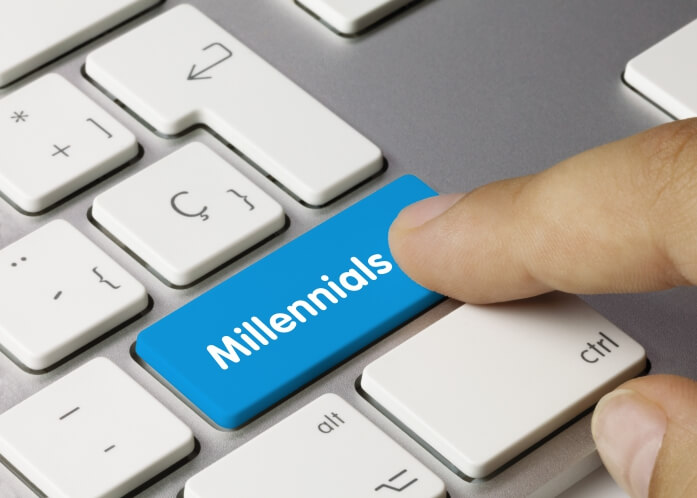4 Debunked Myths About Managing Millennials

Take a look at your workforce. Chances are high that it’s generationally diverse, with Boomers, Generation Xers, and Millennials working at every level. That last cohort – Millennials, Gen Y, Generation Next, etc. – has been the subject of boundless research and discussion in the past 15 years.
Often when older generations discuss younger ones, the context is negative and may include words like entitled, unmotivated, and tough to manage. As a leader, when your young Gen Y employees aren’t meeting your expectations, it’s easy to tag the issue as a “generational defect.”
But Millennials exhibit numerous positive characteristics that make them increasingly valuable in the diverse, fast-paced modern workplace. In the oft-cited Connecting Generations: The Sourcebook for a New Workplace, Claire Raines describes Gen Y as “sociable, optimistic, talented, well-educated, collaborative, open-minded, influential, and achievement-oriented.” Yet, this latest generation of workers remains a puzzle to older managers.
If you’re unsure how to manage your young workers, or you feel as though they’re causing problems for your business, it’s may be a function of your own misconceptions.
Are you making snap judgments about your under-30 employees, and are these judgments having a negative effect on production and turnover? If so, how true are your assumptions, and are they based on preconceptions from things you may have read or heard about the Millennial workforce? Let’s examine and debunk some of the tall tales about managing Millennials.
Myth 1: Millennials have no work ethic
The Millennial workforce is only slightly smaller than the Baby Boomer generation. Yet, for the most part, they’re entering the workforce in a weaker economy than previous generations. Align those two factors and you’ve got a hyper-competitive job market. Millennials are forced to hustle and work hard to land a paying gig, so you shouldn’t assume that they wouldn’t do the same for your business.
It isn’t that Millennials don’t want to work. Rather, they don’t believe in the value of work for it’s own sake. They want to work efficiently to balance work time and play time. For them, long work hours do not equal hard work.
They’re achievement-oriented. In your business, this translates to higher production in a shorter time period, allowing for more leisure time. It’s a similar concept to Frank Gilbreth’s notion that so-called “lazy” workers are beneficial because they find the most efficient path to task completion.
As workers, they desire to complete a task well, to do so efficiently, and then put that task in the past. You will frustrate your Millennial employees by expecting them to put in face time beyond what’s required to reach their immediate objectives.
Counter the myth: Create flexible work environments
For Millennial workers, money is important, but time is the ultimate currency. Given the choice, they’ll opt to sprint to drive positive results.
Managers can foster this work style by offering flexible work hours. Some progressive companies even offer unlimited paid vacation time.
Do those sound like foreign concepts to you? Consider this: Millennials are excellent at cooperation and teamwork. They want to work with friends and close peers. That means they’re not likely to abuse paid time off at the risk of letting down their team. Cultivate a culture of trust and your Millennial workers will independently balance production and leisure time.
Myth 2: Millennials are unmotivated
Previous generations have largely been motivated by the future. Promises of raises and promotions are the standard carrot-on-a-stick for Boomers and Gen Xers. The expectation for achieving these goals was a demonstration of commitment through “paying their dues” and working overtime.
Often and especially with older Gen Yers, this generation watched their parents’ endless toil result in menial workplace advancement. Millennials seek a different path.
To older managers, they may appear unmotivated because they’re easily bored. This digital generation is constantly over stimulated. They need a variety of tasks and a clear structure to keep them interested.
Counter the myth: Shake things up and offer the right perks
As a manager, you can create systems that reward quality work. Try offering paid time off on the fly for great, tangible results.
Set clear expectations on what needs to be done. Don’t drag your Millennial employees along with nebulous goals, moving targets, and the promise of future rewards for paid dues without delineating the road to victory.
Myth 3: Millennials don’t respect authority
It isn’t that Millennials don’t respect authority. Actually, according to research from the Center for Creative Leadership, they are more likely than previous generations to give respect and loyalty to authority figures.
That being said, managers need to earn Millennial respect. Gen Y follows leaders based on experience, wisdom, and advice. Their helicopter parents fostered environments that encouraged them to seek frequent counsel and dedicated mentorship. Accordingly, doling out orders without communicating purpose often results in backlash. Millennials reject the “because I’m your boss” reasoning behind assignments.
Counter the myth: Be a mentor, not a manager
Millennials (more so than other generations) desire to find and collect mentors. Constant feedback and advice go a long way in earning due respect and loyalty. Lead by example, and your Millennials are much more likely to stick around.
Mentorship is not a one-way street, though. Gen Y feels their opinion is valuable regardless of their limited life experience. Listen to and heed their thoughts.
Myth 4: You have to manage Millennials differently from other generations
At the end of the day, managing personnel solely based on age is biased. Just like other generations, young workers want to make a positive contribution. They don’t need special treatment as much as they need fair opportunities and consideration. Think of each employee as an individual, not just a member of a generational cohort.
Also try to remember yourself at that age. Did your vision always align with your boss’? Probably not. Like your young workers, you likely spent a great deal of work time wondering what was going on outside the office.
Counter the myth: Recognize your biases
Keep in mind much of the research done that resulted in these myths carried socioeconomic bias. For that and many other reasons, effective managers should do their best to consider each employee individually within the context of his or her life.
Of course, it isn’t universally wrong to heed generational characteristics when hiring or managing a team. You often have to wade through an endless sea of people to find your perfect hire, and the larger your office grows, the more individuals you’ll have to manage in the mix. Heuristics let you do so efficiently. Just make sure that, if you’re going to make judgments about your Millennial workforce, your decisions are based on fact, not fiction.








